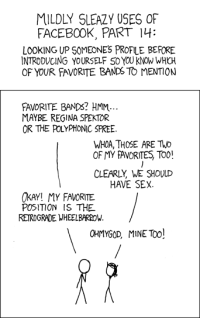I don’t see much anti-female sexism in my immediate surrounds; I notice more that is anti-male. But one place I have been continually put off by anti-female sexism is in attempts to promote gender equality. It seems especially prominent in efforts to seduce me to traditionally non-feminine academic areas. If my ratio of care about interesting subjects vs. social situations were different I might have been put off by the seeming prospect of being treated like a defective sacrifice to political correctness.
Some examples from the advertising and equity policies of various academic places I’ve been:
‘Women can make valuable contributions to …’ implies that this is an issue of serious contention. If most people thought women were of zero value in some fields, this would be a positive statement about women, but they don’t. Worse, the author can’t make a stronger statement than that it is possible for women to create more than zero value.
Appeals to consider myself capable of e.g. engineering despite being female make the same error but this time suggesting that the viewer herself is likely in doubt. Such a statement can only be useful to women so ignorant of their own characteristics that they need to rely on their gender as deciding evidence in what career to devote their lives to, so it suggests the female audience are clueless. The smartest women have likely noticed that they are smart, and will not be encouraged by the prospect of joining a field where others expect them to be intellectually insecure special people to be reassured and included for human rights purposes.
Statements such as women are valuable because they can provide a different perspective on computer science, imply that women can’t understand a computer the usual way, but might help figure out how to make it more personable or something. If this is true, why not just say ‘women are not that valuable in computer science’?
Policies of employing a certain number of female staff to provide role models or leadership for female students imply that females would rather aspire to femalehood than to superior ability (presumably the decision criteria forgone).
Recommendations that courses like mathematics should be more focussed on women say that while existing mathematics is about completely gender neutral abstract concepts, not men, it is unsuitable for women. Presumably either women are not up to abstract concepts, or women can’t be motivated to think about something other than women. Despite whichever inadequacy, they should be encouraged to do mathematics anyway by being taught to work out the mean angle of their cleavage or something.
Why do so many attempts at equality seem so counterproductive? The above seem to fall into two processes: first, assuming that society believes women might be useless, advertising this, and arguing against it so badly as to confirm it, and second, trying to suck up to women by making things more female related at the cost of features capable women would care for. Perhaps those more concerned about anti-female sexism make these errors more because they have an unusually strong impression of society being anti-female and their own obsession with femininity makes it easy to overestimate that of most women.



